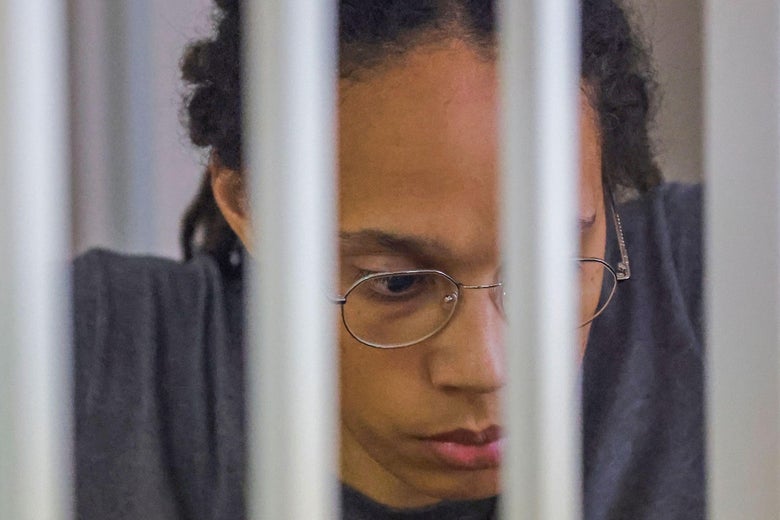
On Thursday, WNBA superstar Brittney Griner was sentenced to nine years in a penal colony in Russia after she pleaded guilty to illegally bringing hashish oil inside a vape cartridge into the country, where she plays professionally during the American pro league’s off-season. Griner was also fined 1 million rubles, roughly equivalent to $16,260, in the judge’s decision.
Since Griner’s arrest and detention in February, many have speculated that her identity as a prominent queer Black woman made her a special target for Vladimir Putin’s government, which deploys anti-LGBTQ and anti-drug rhetoric and policies as pillars of its cultural propaganda campaigns. And because the charges came amid the start of Russia’s invasion of Ukraine, many observers also suspect that Griner is being used as leverage to ease international sanctions spearheaded by the United States since the war began.
The Biden Administration has reportedly explored a prisoner exchange with Russia that would involve exchanging Viktor Bout, a notorious international Russian arms trafficker known as the “Merchant of Death,” for Griner.
Advertisement
Advertisement
Advertisement
Advertisement
Last month, The Waves, Slate’s podcast on gender and feminism, discussed Griner’s detention, the possible prisoner exchange, the coverage she’s receiving in Russia and in the American media as a queer Black woman, and the realities and choices available for the best female sports stars in the world. A portion of the conversation between Waves producer Cheyna Roth and Amira Rose Davis, a historian, professor, and co-host of the feminist sports podcast Burn It All Down, is transcribed below. It has been edited and condensed for length and clarity.
Cheyna Roth: In May, Brittney Griner’s wife, Cherelle Griner, sat down with Robin Roberts of Good Morning America about what was at the time Brittney’s 100-day stint in Russian detention.
Advertisement
Robin Roberts: I know that you want to speak with President Biden.
Cherelle Griner: Absolutely. I just keep hearing that he has the power. She’s a political pawn. So if they’re holding her because they want you to do something, then I want you to do it.
Roberts: And I know that Secretary Blinken has reached out to you and has communicated to you that: top priority. Do you feel that’s the case?
Griner: I don’t know. I was grateful for the call. You say she’s top priority, but I want to see it, and I feel like to see it would be me seeing B.G. on U.S. soil. At this point, I don’t even know who I’m getting back when she comes back.
Advertisement
Advertisement
Advertisement
Roth: Since then, Griner has pleaded guilty. Also, former New Mexico Gov. Bill Richardson is reportedly planning a trip to Russia to try and negotiate Griner’s release. But other than that, not a whole lot has happened. And for Griner to be sitting in a Russian prison I’m sure each day feels like a year.
Advertisement
Advertisement
Amira Rose Davis: It just breaks my heart to hear the pain that so many carry around this, especially of course, Cherelle. I mean, I think that it’s one of these things that when she was first detained over there, a lot around her camp, a lot in her circle, a lot of us who cover women’s sports were kind of told, “Don’t make a big deal out of it, because it will be easier to get her home quickly and safely if we don’t talk about it, if it’s handled under the radar.” And I think part of the sting of this is that for the first month that was what so many of us did, scared to talk out, scared to raise the alarm about this, because suddenly you have the State Department promising—it’s just like a whisper network, almost. And now here we are; it’s been months. It’s very clear that strategy was not the strategy. Now we’re into the place where we have op-eds. We have people speaking out, we have these interviews happening, and it still doesn’t feel like the needle’s really being moved in the way that it needs to be.
Advertisement
Advertisement
Advertisement
Advertisement
I think there was a feeling once the State Department classified her as wrongfully detained that things were going to move faster. And I feel like this has been month after month of false hope, almost. And so I feel weariness; my reaction at this point is very weary. It’s still quite terrifying not to really know what’s going on and to feel like you have to put belief in a system, in an administration who is saying the things, but as Cherelle said, how can we measure the actions? There have been none. And at that point, what is the value of words and prayers and thoughts and prayers, again and again. We know what that is.
Advertisement
Advertisement
Roth: I want to go back to that interview with Cherelle Griner. There is a part where Robin and Cherelle talk about Brittney Griner, or BG, as Cherelle calls her, and her experience playing overseas.
Roberts: And she had spent quite a bit of time in Russia playing for the team there. What was her experience like prior to this?
Cherelle Griner: Honestly, great. You know you are a GOAT if you can actually play in Russia on the team BG plays for. They treat them like superstars.
Advertisement
Roth: There’s been some talk about female players needing to play overseas because it pays a lot better than playing in the U.S. And to put that into perspective, the average annual salary for the 2021-2022 season in the NBA was $7.34 million, according to Statista. For the WNBA, the women’s league? It was $120,000. The highest earners in the women’s league make less, a lot less, than the league minimum for NBA players, which is insane. But what also really struck me here was treating a female basketball player like a superstar. Honestly, I feel like in the U.S., yes, we sometimes get shining female stars that everybody knows and talks about, but it happens so rarely. Griner’s coach Vanessa Nygaard spoke to this on July 4 during a press conference.
Advertisement
Reporter: Do you think there’s enough outcry about it?
Vanessa Nygaard: No. No. We, in women’s sports, we don’t get as much coverage, and so we get 4 percent of the media. And so, because of that this has gotten 4 percent of the attention it probably should get. This is devastating. We have an Olympian, we have the best, the most dominant player in the WNBA is not playing. And it’s crazy. And there’s been lots of people put attention to it, but there’s more people out there and there’s more that can be done. And we just, hopefully, hopefully this message, on this important day for us, will amplify.
Advertisement
Advertisement
Advertisement
Advertisement
Davis: Yeah, I think you can hear right there so much of the tension and how it throws it into conversations about the infrastructure around women’s sports in general: The fact that you have to go overseas, the disparate treatment that you receive at home versus overseas. I know it’s hard to imagine women athletes being treated like superstars. And I would say one of the big things and big differences is that we in the United States have individual superstars who usually play individual sports, like Serena Williams, like Simone Biles. But the team sports, particularly women’s basketball, that’s constantly looking for these breadcrumbs, looking for like some glimpse of respect and resources.
Advertisement
And so it’s far-fetched in our head sometimes to think about what it looks like to have women athletes treated like superstars in other spaces, but it’s true. You have these long-standing international labor markets in which there’s really a standard of resources, of pay, certainly of experiences. And so, while it’s a hard decision for a lot of people to go abroad, they also are staying in good hotels or on private planes. And that actually is part of the reason why the arrest was so shocking. A lot of times they handle the coming in and coming out of the countries. You have a driver; you’ve done this so many times that there’s a system to it. And part of the agreement is that you’re kind of insulated from some of the other cultural politics that might be happening on the ground where you’re playing. Russia has long been a place where women’s basketball players are able to go, many of them queer. And part of that is because they’re in a kind of insulated bubble away from the policies that the Russian government might be implementing against gay people. And so if you think about that, you think about how shocking it is to then suddenly have the machinery that usually protects you when you’re abroad be absent.
Advertisement
Advertisement
Advertisement
But the other thing that I think Vanessa Nygaard touched to in that statement was that, absolutely it’s not just the infrastructure of the pay disparity that has them over there in the first place, but because the media coverage is set up in the way that it is for women’s sports—meaning there’s basically none—it’s very hard to get not only traction about these stories, but then to have people who actually know what they’re talking about being able to get these stories written and heard. And what we’ve seen is a lot of misinformation, a lot of shoddy reporting. And I think a lot of that comes from people who don’t know anything about women’s basketball now trying to report on a developing situation.
Advertisement
Roth: Yeah, I think for a lot of people, the initial reaction is probably, “Well, if they’re playing overseas, they’re probably not a good player.” You kind of have this assumption that, “Oh, they’re overseas. That’s for the people who couldn’t make it in the United States.” Whereas with female sports, it’s the exact opposite. I don’t think a lot of people realize that.
Advertisement
Advertisement
Davis: Right, for sure. And you are often seeing some of the biggest names go over there, because in reality they’re the ones who can get those lucrative contacts overseas. If you are a developing player, you can play overseas, but we’re not talking about the superstar treatment at that level. And it’s actually why the WNBA has been working in their new collective bargaining agreements to try to keep their superstars like Brittney Griner home, so that they can try to build this league up and not have their best players also go be the best players around the world. And you can see why that’s a targeted thing. And especially now, it throws that right back into the spotlight. Isn’t this a searing indictment on how we value women and how we value women in sports here, that somebody’s even in this position in the first place.
Advertisement
Advertisement
Roth: Later in the discussion I mentioned earlier, Nygaard had this exchange with a reporter.
Nygaard: Yeah. If it was LeBron, he’d be home, right?
Reporter: Yeah. That really sucks.
Nygaard: It does. It’s a statement about the value of women. It’s a statement about the value of a Black person. It’s a statement about the value of a gay person. All of those things. And we know it. And so that’s what hurts a little more.
Advertisement
Roth: So, yes, in this whole case, there are a ton of political implications here, but I don’t necessarily think she’s wrong. At minimum if LeBron James was not heard of for two weeks, everybody would notice. And when we get back to the idea of the value of a woman, of a gay person, of a Black person, I mean it’s hard to not feel that when we’re talking about actually trading people, about trading Griner for a Russian prisoner in America. Is BG worth one arms dealer? Do we have to throw in another American to make it worth it? And I’m being glib on purpose. Obviously we want all of these people that are wrongfully detained to come home. But it’s hard to not question how we’re valuing these lives.
Advertisement
Davis: LeBron wouldn’t be there in the first place, wouldn’t be in that situation in the first place. But absolutely, I think there’s a lot that this moment and this case says about how we value people. And I think, ironically, Russia reportedly brokering this deal for an arms dealer known as the “Merchant of Death” is because they see, ironically, and have ascribed much more value to BG than the United States has. Both in how they support athletes like BG when they’re over there playing. But I think that it’s interesting because now it puts the United States in a place to say: Is one or two American lives worth this Merchant of Death? It’s absolutely uncomfortable, especially when you have a great portion of the country who would already dispose of Black people and queer people and women. And so it’s hard to take the country at face value when you see a lackluster response to try to bring BG home, or you hear only certain voices calling for her to be home. It feels like that disposability that so many people know and live and are well aware of—it feels like it’s on full display at this moment. Quite literally.
Listen to this full episode of The Waves below, and subscribe to the show in Apple Podcasts, Spotify, or wherever you get your podcasts. For ad-free episodes, bonus segments, and unlimited reading at Slate, subscribe to Slate Plus.







